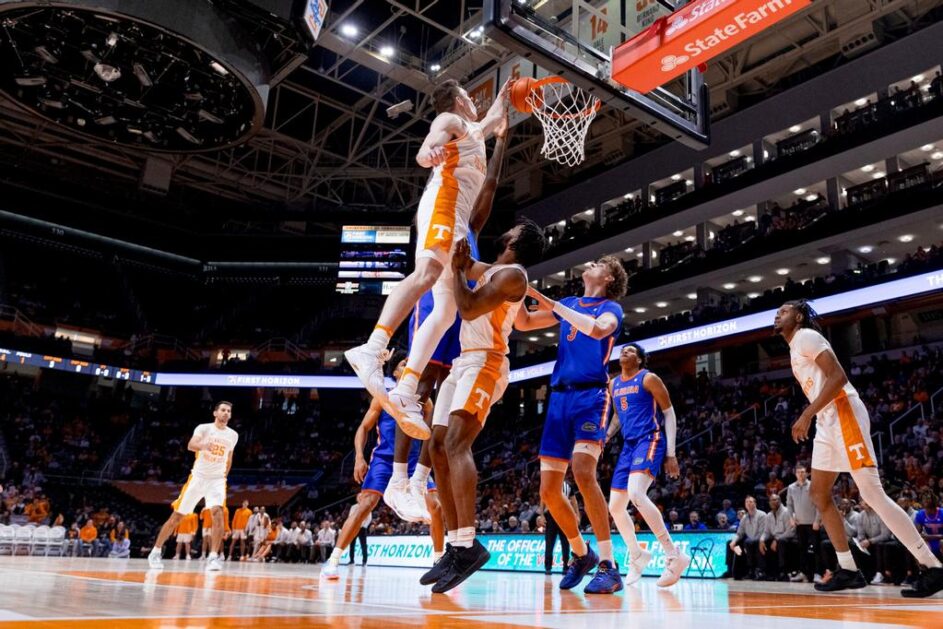Let us agree that Dalton Knecht, in a very short time, became one of Tennessee’s best-ever basketball players.

Zakai Zeigler and Dalton Knecht pose with a post-game meal at Freddy’s, an NIL partner with the two (photo submitted)
He could score from almost anywhere. He hit a bunch of threes, poured in mid-range jumpers and took it to the hoop. He scored 780 points, second-most ever by a Volunteer.
Thirty-three years ago, Allan Houston had 806 for a team that went 12-22. What Knecht did mattered.
He played with passion. He learned to do some defense. He competed for rebounds. He unselfishly fed teammates on the break.
He was not a hired gun. He wanted to be at Tennessee. He said how much he enjoyed his season and appreciated those who welcomed him. He saluted Rick Barnes and other coaches who helped him improve. He was player of the year in the Southeastern Conference.
Knecht is one of four consensus first-team all-Americans in Tennessee basketball history. Bernard King was first. Then came Dale Ellis and Grant Williams.
Now I ask you, where does Dalton Knecht fit among the legends? Think evaluation of career impact. He is the first one-year Vol even considered.
The following list covers three-fourths of a century. It was compiled a couple or three years ago by mostly elite panelists who actually saw most of these stars shine: Jerry Van Hoozier, Tennessee fan almost forever; Hank Bertelkamp, Tennessee forward, 1950-53; Bud Ford and Tom Mattingly, historians from the UT sports information department; Roland Julian and me, UT students beginning in 1951, career sportswriters.
In the name of transparency, this was my project. I chose the voters. I counted the votes. Rank has never been set in stone. It is negotiable, except for King. He was No. 1 on everybody’s ballot.
Here’s your chance to tell it like it is. You are invited to send an e-mail, marvinwest75@gmail.com. All you have to say is Knecht belongs high on the list, middle, lower or wherever. If you want to be different, you can say he wasn’t quite good enough.
Bernard King averaged a school record 25.8 points and 13.2 rebounds for his career. He was three times SEC player of the year and the seventh selection in the 1977 NBA draft. He is the only Vol in the Naismith hall of fame.
Ernie Grunfeld could come off the wing like a Sherman tank and there was no stopping him on his way to the rim. He scored 43 on one eventful evening at Kentucky. He averaged 22.3 over 101 games. His name was first in the Ernie and Bernie Show.
Dale Ellis was underused by Don DeVoe. He could go for the goal or play bombs away from the far-out wing. His career field-goal percentage was an astounding 59.5. He was twice SEC player of the year and, later, a great shooter from behind the NBA three-point line.
Ron Widby, hometown hero, could score from the wing or high post. He willed the Vols to the SEC title in 1967. He made a school-record 19 field goals against LSU. He was SEC player of the year and main man on UT’s first NCAA tournament team.
Allan Houston, classic jump shooter, was the most prolific scorer in Tennessee history. His 2,801 points rank second in the SEC. He played on mediocre teams. Despite extra attention from defenses, he averaged 21.9 over 128 games. Twenty-three times he scored 30 or more.
A.W. Davis was a genuine star. Adolph Rupp rolled into Rutledge to claim him for the Kentucky Wildcats. Davis was polite, thanks but no thanks. Rupp couldn’t believe it. A.W. was a sophomore on Ray Mears’ first team. He averaged 17 points and eight rebounds and was a natural leader. He led in scoring and rebounding for three consecutive seasons.
Grant Williams was twice SEC player of the year. As a junior in 2018-19, he had 18.8 points, 7.5 rebounds, 3.2 assists and high IQ. Decision to go pro early paid off, first-round selection by the Boston Celtics, first contract was $4.872 million.
Reggie Johnson, 6-9 and 210, was a four-year starter who three times led his team in scoring and rebounding. Reggie is fifth in career scoring with 2,103.
Jimmy England excelled at shooting the ball, passing it and protecting it. Mears considered him a coach on the court. He was clutch in late-game situations when working the clock and making free throws (88.1 career average). He guarded the best opposing guard. He had a memorable duel with Pete Maravich at Stokely in 1970, matching the Pistol point for point.
Chris Lofton was a deadly long-range shooter. Unforgettable were his 35 points and a spectacular three over Kevin Durant in the 2005 Texas game. As good as he was in baskets, his big win was over testicular cancer before his senior season. Brave guy, really tough.
Bill Justus was a heralded one-on-one player. He had the winning shot at Stokely in 1969 against Florida. He made the critical free throws at Mississippi State to clinch an SEC title. He was a great defensive competitor and an academic all-American.
Danny Schultz was a classic outside shooter who believed every shot was going in. He had great touch on free throws – 87.2 in 1963 and 89.4 in 1964. If you are keeping score, he once hit 39 in a row.
Tony White was dubbed “Wizard.” He wanted the ball when the game was on the line. He broke Widby’s 1967 arena scoring record of 50 by a point. Tony is third in career scoring with 2,219 in 127 games.
Tom Boerwinkle was seven feet tall and a rags-to-riches story. Kentucky didn’t give him a glance at prep school 12 miles from Lexington. He was a developmental project at Tennessee. He gained endurance, learned to play and averaged a double-double as a junior and senior. The best came later: fourth pick in the 1968 NBA draft and 10 years with the Chicago Bulls.
Wayne Chism is in the record book: 12th all-time in scoring, 5th all-time in rebounds, 2nd all-time in offensive rebounds, 10th all-time in blocks. Chism was a core piece of the 2008 and 2010 Vols that reached new heights.
Gene Tormohlen, 6-8 and 215, nicknamed Bumper, was an absolute force on the backboards. Check these per-game rebounding numbers: 31, 28, 27, 26, 25 three times, 24 and 23 six times. Sixty-five years ago, he set the career record at 1,113. It stands.
Carl Widseth’s nickname was Spook. He was thin and pale and seemed to glide effortlessly around defenders. He was only 6-3 but played center in the 1950s. Carl averaged 19.1 in points and 10.6 in rebounds, fourth best all time. He had 56 career doubles.
Dyron Nix, third in career rebounding, eighth in career scoring, had a burning desire to be the best. He wanted teammates to be as competitive as he was. Nix finished with 1,877 points, 85 behind Bernard.
There are others … Don Johnson, Ron Slay, Austin (Red) Robbins, Ed Wiener, Mike Edwards, Admiral Schofield, Tony Harris, Rodney Woods, some we missed … and Knecht.
Marvin West welcomes comments or questions from readers. His address is marvinwest75@gmail.com

